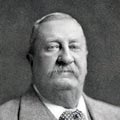A Tropical Island, Part 6
When I adjourned on the island there were only nine families in residence all told. They were of various nationalities. Two were Chilian, one Portuguese, one German, one Spanish, one French, one Italian, one English, and one Swiss of German extraction—the last being the family of de Rodht, the Governor.
The Italian had been banished for life from Chile. The Chilians had long suspected him of smuggling, and of receiving stolen goods. So they set a trap for him, and he fell into it. Some of the Angamos men were ordered to induce him to purchase of them some new ship’s stores—mattresses and so forth. They found him nothing loth. The same night police were sent to arrest him. When they arrived at the Italian’s residence, he was enjoying his dinner in a room which commanded a view of the path the emissaries of the law had to traverse. He told his wife to admit no one. The police, however, insisted on seeing him; so he retired to his bedroom and locked himself in. The police followed him and demanded admittance. This he refused to grant. When the Government men purposed to break down the door, he threatened to shoot the first man who crossed the threshold. Having reason to believe he would be as good as his word, the police resorted to a device they had put into operation on similar occasions. They bored holes in the bottom of the door, and set light to a concoction of sulphur, red pepper, cotton wool, etc. The fumes they contrived to introduce into the Italian’s room. So effectual did this artifice prove that the Italian was soon glad to open the door. His arrest and trial followed, as a matter of course. The charge preferred against him was proved up to the hilt. When sentenced, he was given the option of being deported to Juan Fernandez, in lieu of serving twenty years’ imprisonment. Like a sensible man he chose the island.
The culprit was not devoid of good feeling, for he told his wife he couldn’t expect her to stick to a beggar-man; so the best thing she could do would be to apply for a divorce, and marry some other man better calculated to bring happiness into her life. His spouse was a most beautiful woman, and a wonderful musician. Moreover, her age was twenty-seven years less than her husband’s. Hence she would have experienced little difficulty in finding a suitable partner. But—who can gauge the strength of a woman’s love?—this noble girl would have none of it. “What!” she cried. “Forsake you now you are down and out? Never! I took you for good or bad, for richer or poorer. Where you go, I will go.” So it came to pass that when the Italian was sent to Juan Fernandez, he did not go alone; his faithful wife accompanied him. She willingly turned her back on all the attractions of society for the sake of the man she loved.
As may be imagined, the houses in which the majority of these nine families lived were quite unpretentious. Most of them were constructed of native-grown timber and corrugated iron imported from the mainland, but those belonging to Arrendondo, De Rodht, Correros, and myself were very nicely built.
Fishing, catching lobster, extracting shark oil, and fish curing were the only industries pursued by the inhabitants. Fonck exploited lobsters, and I dried fish. I tried to extract oil from cod, but failed. Unlike the Newfoundland and Norwegian varieties, its liver contained none. Shite, Fonck’s manager, and I used to open our stores every Saturday from 10 o’clock till 1 p.m., allowing all who required provisions to have them on tick. Owing to an old law permitting the sale of liquor only in those districts where there are resident police, none was allowed to be sold on Juan Fernandez. As there were no doctors, so there could be no frail women. Male offenders against public morality were punished by five years’ imprisonment on the mainland. Females got a similar stretch in the House of Correction.
My own views as regards alcohol are these. It is a thing sent for our use, it is of incalculable value in tropical countries, but its abuse is to be deprecated. I felt that a certain amount of alcohol was an absolute necessity for the male residents at least, so I had no compunction in giving such of my customers as I judged would make proper use of it, a small quantity from time to time.
